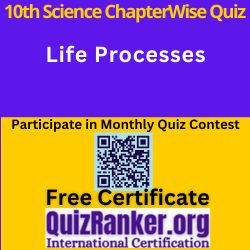10th Science Life Processes MCQ Test Chapter 5: Boost your understanding with free online multiple-choice questions for CBSE Class 10 Science Chapter 5. Explore essential life processes including nutrition, respiration, and circulation. Ideal for CBSE exam preparation and competitive tests.
Science Life Processes MCQ Test Quiz
Chapters of 10th Science for MCQ Test
You can not only check your knowledge about for “10th Science Life Processes MCQ Test Chapter 5” but also all remaining chapters multiple choice questions.
Chapter 1 Chemical Reactions and Equations MCQ Test
Chapter 2 Acids, Bases and Salts MCQ Test
Chapter 3 Metals and Non-metals MCQ Test
Chapter 4 Carbon and its Compounds MCQ Test
Chapter 5 Life Processes MCQ Test
Chapter 6 Control and Coordination MCQ Test
Chapter 7 How do Organisms Reproduce? MCQ Test
Chapter 8 Heredity MCQ Test
Chapter 9 Light – Reflection and Refraction MCQ Test
Chapter 10 The Human Eye and the Colourful World MCQ Test
Chapter 11 Electricity MCQ Test
Chapter 12 Magnetic Effects of Electric Current MCQ Test
Chapter 13 Our Environment MCQ Test
Also Attempt Free 10th class Math chapter wise MCQ Quiz [For Exam 2025]
Must Attempt Monthly Quiz Contest
- Class 9th Science quiz contest monthly
- Class 9th Math quiz contest monthly
- Class 10th Science quiz contest monthly
- Class 10th Math quiz contest monthly
You can also participate in yearly national quiz contest Dec 2024
Important Link
- NCERT Books PDF
- Our Youtube Channel(Subscribe for view Few Quiz Question Answers)
About Science Life Processes MCQ Test
Chapter 5 of the CBSE Class 10 Science curriculum, titled “Life Processes,” covers the essential biological processes that sustain life in living organisms. This chapter is fundamental for students aiming to gain a deeper understanding of how organisms maintain their functions and health. The free MCQ quiz provided in this chapter will help students reinforce their knowledge and prepare effectively for their CBSE examinations.
Key Concepts Covered:
- Nutrition:
- Nutrition is the process by which organisms obtain and utilize food for growth, energy, and repair.
- In plants, nutrition involves photosynthesis, where they convert sunlight, carbon dioxide, and water into glucose and oxygen.
- In animals, nutrition includes ingestion, digestion, absorption, and assimilation of food.
- The digestive system in humans breaks down food into simpler forms that can be absorbed and used by the body.
- Respiration:
- Respiration is the process of converting food into energy through biochemical reactions.
- There are two types of respiration: aerobic (with oxygen) and anaerobic (without oxygen).
- Aerobic respiration occurs in the mitochondria and produces a large amount of energy. The general equation is: C₆H₁₂O₆ + 6O₂ → 6CO₂ + 6H₂O + energy.
- Anaerobic respiration occurs in the cytoplasm and produces less energy. It results in by-products like lactic acid in animals and ethanol and carbon dioxide in yeast.
- Transportation:
- Transportation is the movement of substances such as nutrients, gases, and waste products within an organism.
- In humans, the circulatory system, consisting of the heart, blood vessels, and blood, facilitates transportation.
- The heart pumps oxygenated blood from the lungs to the body and returns deoxygenated blood from the body to the lungs.
- Plants have vascular tissues (xylem and phloem) that transport water, minerals, and nutrients throughout the plant.
- Excretion:
- Excretion is the process of removing metabolic waste products from the body.
- In humans, excretion is carried out by the kidneys, which filter blood to produce urine.
- Other excretory organs include the skin (sweat) and the lungs (carbon dioxide).
- In plants, excretion occurs through the stomata (loss of oxygen and water vapor) and various other mechanisms.
- Control and Coordination:
- Control and coordination involve the regulation of various life processes to maintain homeostasis.
- The nervous system and endocrine system are responsible for control and coordination in animals.
- The nervous system uses electrical signals to transmit information, while the endocrine system uses hormones.
- In plants, coordination is achieved through chemical signals and hormones that regulate growth and response to environmental stimuli.
Quiz Structure:
The MCQ quiz for this chapter includes a series of questions designed to test students’ understanding of life processes such as nutrition, respiration, transportation, excretion, and control and coordination. These questions cover definitions, mechanisms, and functions, ensuring comprehensive coverage of the chapter. The interactive format allows students to practice and assess their knowledge effectively.
Conclusion:
Practicing with the 10th Science Life Processes MCQ Test Chapter 5 is an excellent way for CBSE students to prepare for their exams. This chapter provides a thorough understanding of the fundamental life processes essential for the survival and functioning of living organisms. The MCQ quiz helps reinforce these concepts, ensuring students are well-prepared for their academic assessments and competitive exams.
Total Views: 150
